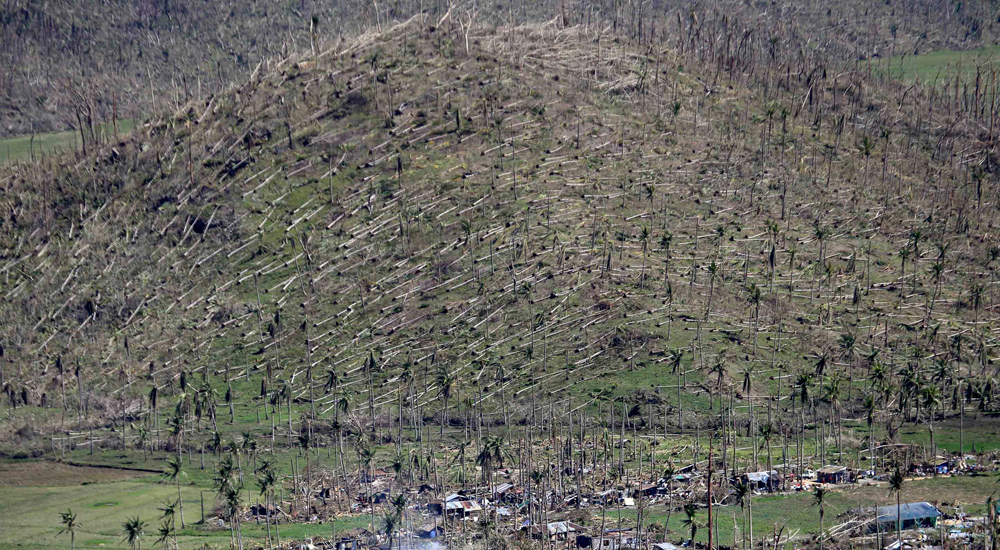ADB says PH faces deadlier typhoons

A mountain in Leyte with toppled coconut trees after the Nov. 8 Supertyphoon “Yolanda” ravaged Leyte and other provinces in central Philippines. AP FILE PHOTO
Climate disasters may double in the next two decades unless the world cuts its carbon dioxide emissions, the Asian Development Bank (ADB) said on Friday, with “high risk” nations in Asia—like the Philippines—set to be hard hit.
Two days before a world climate summit opens in Paris, the Manila-based lender said deadlier storms, floods and heat waves were linked to rising global temperatures, adding to a growing chorus on the catastrophic effects of climate change.
The Paris meeting represents the first bid for a truly global climate rescue pact since the chaotic 2009 summit in Copenhagen ended in disappointment.
The United Nations summit will be officially opened on Monday by more than 150 heads of state and government—among them President Aquino—making it the biggest gathering of world leaders on climate in history.
The ADB report, which looked at disasters from 1970 to 2013, said if carbon dioxide concentration in the atmosphere continued to rise at an annual rate of two parts per million, the frequency of climate disasters could double in 17 years.
Article continues after this advertisementGlobal damage: $142B
Article continues after this advertisementThis meant the average country could experience 1.55 climate disasters per year, compared to the current average of 0.775, the study added.
It said three “high risk” countries—the Philippines, Indonesia and Thailand—would be particularly affected, citing Supertyphoon “Yolanda” (international name: Haiyan) in 2013, which left 7,350 people dead or missing after wiping out poor fishing communities in the Philippines’ central islands.
“Any further increases in CO2 (carbon dioxide) would hit these countries hard,” the ADB said.
Also at risk were emerging nations’ economic growth rates, the bank added, stressing that tackling climate change would boost prosperity levels.
The ADB, a Japan-led institution modeled on the World Bank, said the global damage bill from natural disasters was steadily rising, with the most recent decade, 2005-2014, costing some $142 billion, up from $36 billion during 1985-1994.
It said climate-related disasters had cut into the growth rates of Australia, China, Indonesia, Thailand and Vietnam and the trend was “set to worsen.”
Countries should invest in a shift from fossil fuels to renewable energy to reverse this, it said.
“Policymakers and economic advisers have long held the view that climate action is a drain on economic growth,” the ADB’s Vinod Thomas, a coauthor of the study, said.
“But the reality is the opposite: The vast damage from climate-related disasters is an increasing obstacle to economic growth and well-being.”
The goal of the Paris summit is to negotiate a pact to keep global warming below 2 degrees Celsius (3.6 degrees Fahrenheit) over preindustrial levels. AFP
RELATED STORIES
Obama eyes chance to make mark at last on climate change